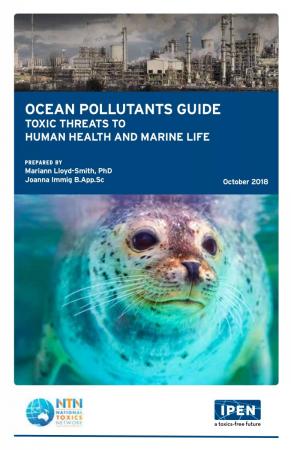At-A-Glance Views

Ocean pollutants include persistent organic pollutants, endocrine disrupting chemicals, mercury compounds, plastic wastes and related chemical compounds, as well as other industrial and agricultural emissions. These toxic ocean pollutants disproportionately impact remote Arctic and Pacific Island communities, but they are a serious threat to the environment, food security, health, culture and human rights of all of us.
Marine pollutants are threatening the health of our oceans. Every day, a cocktail of intentional and unintentional chemical releases, as well as the unrelenting tidal wave of wastes, particularly plastic waste, enter our oceans and waterways.
Ocean pollutants include persistent organic pollutants (POPs), endocrine disrupting compounds (EDCs), mercury compounds, plastic wastes and related chemical compounds (e.g., BPA, phthalates), as well as other industrial and agricultural emissions. These toxic ocean pollutants disproportionately impact remote Arctic and Pacific Island communities, but they are a serious threat to the environment, food security, health, culture and human rights of all of us.
IPEN research has already demonstrated the impact of mercury pollution in the Asia Pacific region, and IPEN’s work on new POPs, through the Stockholm Convention POPs Review Committee, has highlighted the increasing detection of new POPs such as PFOS (perfluorooctane sulfonate) and PBDEs (polybrominated diphenyl ethers / brominated flame retardants) in the marine environment.
IPEN’s campaigns for non-combustion destruction of hazardous waste have highlighted the failures of countries to manage hazardous and plastic wastes, which results in ongoing chemical contamination of the oceans and predictions that there will be more plastic by weight than fish in our oceans by 2050.
In response to the increasing threat of marine pollutants in our oceans, IPEN has developed the ‘Addressing Ocean Pollutants Platform’ incorporating commitments to address identified problems. The platform is based on the principles of good chemical management; right-to-know, polluter pays, precaution and substitution, as well as the principles of social, environmental and intergenerational equity.
Read the platform here.
Additionally, the 2018 comprehensive report, Ocean Pollutants Guide: Toxic Threats to Human and Marine Life, released by IPEN and the National Toxics Network (NTN), provided an up-to-date synthesis of data on toxic chemical ocean pollution, including hazardous pesticides, pharmaceuticals, persistent organic pollutants (POPs) like PCBs, plastics, microplastics, and heavy metals, and exposes their sweeping impacts on marine and human life. A valuable resource for policy makers, the report bridges information gaps between ocean health and chemical safety, and highlights critical policy opportunities for action by bringing simultaneous visibility to the role of invisible toxic chemicals and plastics.
Main Right Block
Debug toxic priority variant


